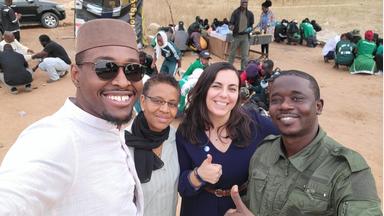225 Humphrey School
301 19th Avenue South
Minneapolis, MN 55455
United States
The Master of Development Practice (MDP) program prepares young professionals for careers in sustainable development—globally, locally, and in the complex realities in between.
A strategic blend of training in theory and practice equips MDP graduates with knowledge, skills, and competencies essential to appropriate and effective engagement with the broad coalitions addressing society’s complex sustainable development challenges. Poverty and inequalities, social and environmental justice, and the causes and effects of a rapidly changing climate are a few of the thematic areas toward which our alumni gravitate.
The interdisciplinary MDP degree features training across the University, with courses in public policy, public health, education, and the natural and social sciences. This distributed approach fosters the integration of knowledge that is necessary for addressing the grand and systemic challenges confronting society and the development professions. Our MDP experience centers on engagement. Student inquiry and action typically begin with challenges framed by local and global partners, with engaged learning experiences occurring through campus-based coursework, field-based summer placements,* a culminating capstone project, and a variety of co-curricular opportunities.** (see more below)
Minnesota’s MDP program is a member of the MDP Global Association, which is part of the Sustainable Development Solutions Network’s (SDSN) Sustainable Development Academy. Our program is a cooperative, interdisciplinary endeavor comprising faculty from six collegiate units at the University of Minnesota. MDP faculty work both locally and globally, and with notable partnerships and extensive experience in Colombia, Guatemala, Tanzania, Kenya, South Africa, Egypt and the Middle East / North Africa region. The Minnesota MDP program is jointly administered by the Humphrey School of Public Affairs and the Interdisciplinary Center for the Study of Global Change (ICGC).
Class profile and career statistics
MDP Class Profile: 2023-24
- Incoming Students: 9
- Minnesota Residents: 22%
- International Students: 56%
- Gender: Female: 56%, Male: 44%
- Domestic Students of Color: 22%
- Average Age: 32
- Average GPA: 3.38
- Average GRE Verbal Percentile: 73%
- Average GRE Quantitative Percentile: 57%
- Percent of Class total: 5%
MDP Career Statistics: Class of 2022
8 graduated, 8 known reported (100%)
- Known employed or continuing to further degree: 88%
- Actively job seeking: 13%
- Government employment:12%
- Nonprofit employment: 25%
- Private sector employment: 38%
- Academic staff: 12%
Prospective applicants: please note that all applications are reviewed holistically, and profile numbers should not be viewed as admission cutoffs. Please contact the Office of Admissions with any questions about candidacy.
Note: These numbers reflect the most recent data available; due to rounding, percentages may not always add up to 100 percent.
Curriculum
The Master of Development Practice requires 50 semester credits, including 43.5 credits in interdisciplinary required courses and a 3-credit capstone workshop. The remaining credits are taken in elective courses. An intensive two–week development practice orientation and an international field experience also are required.
REQUIRED CORE COURSES
- MDP 5001 Ways of Knowing for Sustainable Development
- MDP 5002 Program Development Workshop
- MDP 5004 Summer Field Experience
- MDP 5005 Qualitative Methods for Development Practice
- MDP 5100 Post-Field / Pre-Capstone Seminar
- MDP 5200 Capstone Workshop in Development Practice
- AGRO 5321 Ecology of Agricultural Systems
- PA 5031 Statistics for Public Affairs
- PA 5501 Theories & Policies of Development
- PA 5503 Economics of Development
- PA 5521 Development Planning & Policy Analysis
ADDITIONAL SKILLS COURSE OPTIONS
Choose one of the following:
- PA 5003 Introduction to Public Financial Analysis & Management; or
- PA 5032 Applied Regression (recommended concurrent with PA 5521); or
- PA 5044 Applied Regression, Accelerated; or
- PA 5311 Program Evaluation; or
- OLPD 5501 Principles and Methods of Evaluation; or
- EPSY 5243 Principles and Methods of Evaluation
Education
- OLPD 5104 Strategies for International Development Education; or
- OLPD 5107 Gender, Education & Development
Management
- PA 5151 Organizational Perspectives on Global Development & Humanitarian Assistance; or
- PA 5405 Public Policy Implementation
Public Health
Environmental Sciences
- GCC 5008 Policy and Science of Global Environmental Change; or
- GEOG 5401 Geography of Environmental Systems & Global Change
- PA 5751: Addressing Climate and Energy Challenges at the Local Scale (3 cr)
- GCC 5032: Ecosystems Health: Leadership at the Intersection of Humans, Animals and the Environment (3 cr).
You may be exempted from selected core course requirements if you have relevant prior coursework. In that case, you can take additional elective credits to meet the 50-credit requirement.
Program Planning Worksheet
The Program Planning Worksheet (PPW) helps current students plan their degrees from start to finish. Students must submit a completed and approved PPW before graduating.
Capstone Workshop (3 credits)
Capstone Workshops are designed to provide a learning opportunity for MDP students in their second year to apply their knowledge through a client-based team project.
International Field Experience
Students are required to complete a 10-week (400 hours) international field experience, which will include professional work and academic cross-cultural training. Students will complete the field experience during the summer between the first and second year of the program.
ELECTIVES (TO BRING TOTAL DEGREE CREDITS TO AT LEAST 50) CAN BE CHOSEN FROM FOUR MAIN AREAS:
Natural Sciences
ESPM 5061 Water Quality and Natural Resources (3 cr.)
ESPM 5101 Conservation of Plant Biodiversity (3 cr.)
ESPM 5108 Ecology of Managed Systems (4 cr.)
ESPM 5202 Environmental Conflict Management: Leadership and Planning (3 cr.)
ESPM 5207 Emerging Issues in Tropical Agriculture and Forestry: Costa Rica (3 cr.)
ESPM 5251 Natural Resources in Sustainable International Development (3 cr.)
ESPM 5604 Environmental Management Systems and Strategy Development (3 cr.)
ESPM 5251 Natural Resources in Sustainable International Development (3 cr.)
FR 5104 Forest Ecology (4 cr.)
FR 5105 Forest Ecosystem and Health Management (3 cr.)
FR 5142 Tropical Forest Ecology (3 cr.)
FR 5153 Forest and Wetland Hydrology (3 cr.)
GEO 5108 Principles of Environmental Geology (3 cr.)
HORT 5071 Restoration and Reclamation Ecology (3 cr.)
PA 5721 Energy and Environmental Policy (3 cr.)
WRS 5241 Ecological Risk Assessment (3 cr.)
Health and Education
OLPD 5101 International Education and Development (3 cr.)
OLPD 5104 Strategies for International Development of Education Systems (3 cr.)
OLPD 8101 International Development and Education (3 cr.)
PA 5414 Child Labor and Education (3 cr.)
PUBH 6080 Policy, Politics, and Ethics of Public Health Decision-making (2 cr.)
PUBH 6102 Issues in Environmental and Occupational Health (2 cr.)
PUBH 6133 Global Health Seminar (1 cr.)
PUBH 6650 Community-Based Participatory Research (1 cr.)
PUBH 6807 Global Health, Relief, Development and Religious and Non-Religious NGOs (3 cr.)
PUBH 6845 Using Demographic Data for Policy Analysis (3 cr.)
PUBH 6933 Nutrition and Chronic Diseases (2 cr.)
PUBH 8140 Validity Concepts in Epidemiologic Research (2 cr.)
PUBH 8142 Epidemiologic Uncertainty Analysis (2 cr.)
Management and Policy Analysis
PA 5101 Management and Governance of Nonprofit Organizations (3 cr.)
PA 5271 Geographic Information Systems: Applications in Planning and Policy Analysis (3 cr.)
PA 5301 Population Analysis and Policy for the US and Third World (3 cr.)
PA 5522 International Development Policy, Household Economics and Family Health (3 cr.)
PA 8821 National Security Policy (3 cr.)
OLPD 5011 Leading Organizational Change: Theory and Practice (3 cr.)
OLPD 5048 Cross-cultural Perspectives on Leadership (2–3 cr.)
OLPD 5101 International Education and Development (3 cr.)
WHRE 5351 Methods for Change in Developing Countries (3 cr.)
Social Science
ANTH 8120 Problems in Culture Change and Applied Anthropology (3–6 cr.)
APEC 5651 Economics of Natural Resource and Environmental Policy (3 cr.)
GEOG 5007 Theories of Development and Social Change (3 cr.)
GEOG 5385 Globalization and Development: Political Economy (4 cr.)
GEOG 5561 Principles of Geographic Information Science (4 cr.)
GEOG 5565 Geographical Analysis of Human Environment Systems (GIS applications) (3 cr.)
GWSS 8401 Gender, Space, and Resistance (3 cr.)
PA 5801 Global Public Policy (3 cr.)
POL 5441 Environmental Policy (3 cr.)
POL 5485 Human Rights and Democracy in the World (3 cr.)
POL 5872 Global Environmental Politics (3 cr.)
POL 5889 Governments, Global Trade, and Money (3 cr.)
SOC Topics Courses
Summer Field Experiences
The required field experience is an opportunity at the end of the first academic year for MDP students to develop and apply new competencies, skills and knowledge through a client-based, team project in the field, typically internationally. Each student team will be matched with a NGO, public or private sector client engaged in some dimension of sustainable development. While the specifics of each project vary, all will include some degree of project design, in-depth research, analysis and the creation of a final, professional deliverable suited to client needs and expectations. The field placement typically occurs over 10 weeks.
Co-curricular Experiences
MDP students have a range of co-curricular options at the Humphrey School including the Public Affairs Student Association (PASA); school affinity groups such as the Humphrey International Student Association (HISA), the Gender, Sexuality, Policy and Event Committee (GSPEC) and the Humphrey Students of Color Association (HSOCA); and finally, University student groups such as the Interdisciplinary Perspectives on International Development (IPID). In addition, many students participate in the Minnesota International NGO Network (MINN). The University also features numerous thematic case competitions like the Global Health Challenge and Moving the Cities and sends delegations to multi-national summits like the Climate Council of Parties (COP). These experiences extend the curriculum in meaningful and interesting ways by fostering networking, skill-building, and practical engagement beyond academics.




